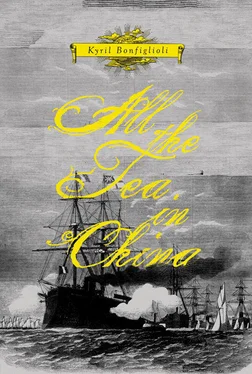At last the Second lifted the speaking-tube and called down to the Captain’s cabin.
“Permission to shorten sail, Sir, and send down sky-sails.”
We could clearly hear Dogg’s answer.
“You have your orders on the watch-slate, Mister. Brace her up to the wind.”
“Sir, I do not believe she can carry this press of sail much longer.”
“What she can’t carry she may drag!” came the drunken bellow.
I tried to catch Peter’s eye, but without success. Looking around, I saw that many of the watch below had silently appeared on deck. There were ugly looks, both at the poop and at the weather. One or two of the squalls were approaching us fast, it seemed to me, and we were scudding along at a terrifying rate, shouldering the ocean aside like a constable shoving his way through a rabble. The Second drew a deep breath, like a man who expects it to be his last, and lifted the speaking-tube.
“Sir,” he said flatly, “I formally request you to come on deck and judge the situation with your own eyes. I shall record this request of mine in the Log.”
The Captain appeared, dishevelled and red-eyed, cursing foully. He looked at the weather, which worsened even as he looked. Then he looked at the sails.
“Send down all to the royals, Mister, and one reef in all plain canvas.”
The Second picked up the “trumpet” — for the noise was now deafening — and relayed the order to the Bosun, who yelled it out piecemeal to the watch. Those who were to reef jumped to their work with alacrity but one gang shuffled their feet and did not otherwise move. The Bosun ranted at them but to no avail. He came to the break of the poop.
“Beggin’ yer pardon, Sir, but the top-men won’t go aloft.”
“ Won’t?” roared the Captain, “ won’t? What kind of talk is that on ship-board?”
“Beggin’ yer pardon again, Sir, but there’s only one proper top-man in the gang, Sir, and he’s got an ’and in bandages still.”
“The men refuse to obey orders?” he whispered horridly.
“Not exackly, Sir. They just reckon it’s suicide to attemp’ it.”
To everyone’s astonishment, the ordinarily mute Second cleared his throat and spoke.
“Forgive me, Sir, but I consider that the men are within their rights. All that raffle of top-hamper will be carried away at any moment and an order which sends men to almost certain death in an effort to save a few light spars and rags of canvas is, by the laws of the sea, an improper order.”
The Captain slowly turned and smiled at him. This was a disgusting sight, for his teeth were nastier than his face.
“Pray write your remarks in the Log,” he said. With that he leaped at the futtock-shrouds and scrambled up like some great ape. Every eye in the ship was on him as he swayed and clung and fought the elements and canvas; but, by God, he took in and sent down all. No sane man would have attempted it, no sober man could have done it.
When he was back on deck, retching for breath and sucking his torn and bloody fingers, he glared about him with a kind of mad happiness.
“Line up the men who refused to obey orders,” he croaked. “I have just shewn that the orders were reasonable, have I not? Line them up, I say, and bring the cat. I am about to flog every man-jack with my own hands.”
“Oh no you ain’t, mister bleeding Dogg,” came a Yankee drawl. The Captain whirled about. One of our Calcutta recruits was pointing a little nickel-plated Bulldog pistol at his breast.
The Captain stood like a stone man for what seemed like a stone age. Wonderfully slowly, gently even, he reached out for the pistol. So persuasive was this gesture that even the coarse American faltered, spellbound until the last moment — but at this last moment he lashed out at the Captain’s knuckles with the barrel of the weapon. Dogg recoiled, snarling, spitting like a cat.
“If you drop that weapon this instant,” he said in the frightening whisper, “then I shall stretch a point and only have you flogged. If you do not, then I swear I shall stretch your neck. Unless, of course” — here he raised his voice — “any of your mates were so foolish as to support you, which would make it mutiny and hangings for one and all.”
The American pointed his pistol into the air and fired a shot. This was a signal, clearly. The men who now crowded the deck shifted to and fro and arranged themselves hesitatingly into two groups. There were whispered curses, threats, promises, and several fellows shuffled first to one group, then to another.
At last all seemed settled.
“How many?” asked the American over his shoulder, never taking his eyes off the Captain and us other officers.
“Twenny-eight,” replied one of his accomplices.
“Fine. Jest fine. Mighty fine. Mister Dogg, you are no longer in command here; I have placed you under arrest as a dangerous lunatic. You are free to leave this vessel, along with your shit-livered officers, who should have locked you up weeks ago. Any men who wish to stay and help work the ship, why, I’ll write their names in the Log and say they had no part in this consarn.”
There was a shuffling and a muttering from the uncommitted part of the crew; I was reminded perfectly of the crowd-scene in Julius Caesar by W. Shakespeare. Dogg leapt at the American with a strangled yell: he was, as they say, fit to be tied, and tied up is what he was, after some compassionate mutineer had hit him on the head often enough to calm him. Peter and the Second strode into the fray, unarmed, ordering the men to lay down their arms and accept their punishments like honest seamen, but their words carried little weight, for all knew that the only punishment was the stretching of the neck to which Dogg had referred. They, too, were bound.
I, as a thoughtful man, had reserved my judgment and, when the fellows wielding belaying-pins and pistols looked towards me I may well have been studying the horizon in an abstracted way. I was, after all, only a supernumerary officer.
There ensued a great deal of sordid bickering and bargaining, during which, to show my contempt for these proceedings, I strolled to the galley and filled my pockets with two double-handfuls of the Doctor’s “tabnabs”. I have always been a practical man.
Soon all arguments were settled. Dogg, the Second, Peter, the sailing-master and a few ancient mariners of warrant rank who had served Peter’s father were to be set into the long-boat. Blanche was to remain aboard. The mutineers snickered at this. They asked me where I stood. I had been thinking.
“Where are you bound?” I asked haughtily, brushing a few crumbs from my lips.
“We’re taking this hooker to the West Indies, brother. When we’ve sold the cargo, why, we’ll jest go into business on our own account. Whole heap of work for a handy little ship in South Americky nowadays, ’spacially if she carries a few guns.”
“And who, pray, is to navigate you to the West Indies?”
“You. We seen you taking lessons.”
“And if I refuse?”
“Guess you kin take your chance in the open boat — but your fancy lady stays here. Calc’late we kin find a use for her.”
I thought some more. A thousand miles in an open boat with Dogg held few attractions and the chances of survival seemed small in any case. Moreover I was, as I have explained, in love with Blanche.
“Very well,” I said. “I’ll navigate you to the West Indies; on conditions.”
“Oh, yeah?” he said (this is how Americans speak, you understand — it means “indeed?”).
“Yes. First, Mrs Knatchbull not to be molested, on your word as an honest seaman. Second, I am to be put ashore in the West Indies with Mrs Knatchbull and my private cargo. Third, I am to retain my pistol for self-protection — you shall have my parole d’honneur that I shall not attempt to seize the ship with it.” I grinned disarmingly at this point. I am very good at grinning disarmingly — I practise. (Verb, sap.) “Fourth, the Captain, officers and seamen leaving in the boat are to be properly provisioned, watered, supplied with a boat’s-compass and two firearms for use when they reach shore and to be given the ship’s position and a sight of the charts before they leave.”
Читать дальше












